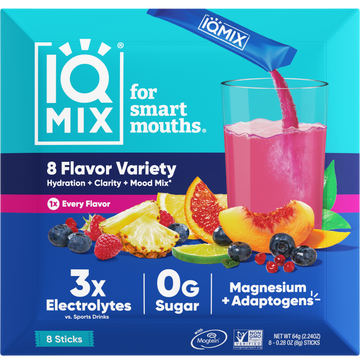Most people know that consuming too much sugar is bad for you (think increased risk of diabetes, heart disease, and cognitive decline—oh my).[*][*][*]This has led many health-conscious folks to seek out sugar substitutes, one of which is stevia.
Known for its intense sweetness and zero-calorie profile, stevia has become wildly popular. But is this sweetener truly a healthy choice, or are there hidden drawbacks you need to be aware of?
Spoiler alert: stevia is safe to consume (not to mention, delicious) and offers several potential health benefits. We’ll explore those shortly, but first, let’s define what stevia is.
What Is Stevia?
Stevia is a natural sweetener derived from the leaves of the stevia plant (Stevia rebaudiana), which is native to South America. This plant has been used for more than 1,500 years by indigenous populations in regions like Paraguay and Brazil to sweeten foods and beverages.[*]
Stevia is about 200 times sweeter than sucrose (table sugar), so a little goes a long way.[*] Stevia’s sweetness stems from compounds called steviol glycosides within the stevia leaf.
Despite its intense sweetness, stevia is non-nutritive, meaning it contains zero calories, carbohydrates, or other nutrients. This makes it an attractive option for many, particularly those with diabetes, people following low-carb diets like keto or paleo, or those looking to reduce their sugar intake.
Health Benefits of Stevia
So, does stevia provide any benefits beyond a sweet taste? Yes! Here are five health benefits to consider:
#1: Blood Sugar Control
Traditional sugar can cause rapid spikes in blood glucose levels. This is not the case with stevia, as demonstrated by a 2020 randomized controlled trial that showed that stevia does not raise blood sugar in people with type 2 diabetes.[*]
Another interesting study involved 32 non-diabetic people who ate a snack containing either table sugar or stevia and were then given free rein at a buffet.[*] Remarkably, in comparison to the group that consumed table sugar, those in the stevia group not only experienced lower post-meal blood sugar levels but also consumed fewer total calories.
#2: Antioxidant Properties
Stevia is rich in natural antioxidants known as phenol, which play a crucial role in reducing oxidative stress—a process that can lead to cell and tissue damage over time.[*] By incorporating stevia into your diet, you introduce a source of antioxidants that may help protect your body’s cells and organs.
#3: Potential Anti-Inflammatory Effects
Chronic inflammation is linked to numerous modern diseases, such as heart disease, dementia, and cancer, making its management vital for overall health.[*]
Some research in mice suggests that compounds found in stevia leaves, such as stevioside, may reduce markers of inflammation, like TNFα, interleukin 6, and interleukin 10.[*]
#4: May Support Weight Loss
Get this: the average American consumes nearly 17 teaspoons of added sugar daily![*] At 16 calories per teaspoon, that’s about 270 calories from added sugar daily.
By replacing sugar with stevia, you can satisfy your sweet tooth without adding empty calories, making it easier to manage your overall calorie consumption.
#5: Dental Health
Unlike sugar, stevia does not promote tooth decay or cavities. In fact, some oral care products incorporate stevia as a sweetening agent due to its tooth-friendly properties.
In one study, Indian children given a stevia mouthwash had less oral plaque and gingivitis than those given other types of mouth rinses.[*]
Stevia Safety and Side Effects
The U.S. Food and Drug Administration (FDA) has granted Generally Recognized As Safe (GRAS) status to steviol glycosides, which are refined extracts derived from stevia.[*][*] This designation signifies that the FDA deems stevia safe for use in food and beverages, a conclusion reached through examination of scientific evidence and consensus among expert authorities.
Other regulatory authorities have established the Acceptable Daily Intake (ADI) for stevia at 4 mg per kg of body weight (or about 1.81 mg per pound).[*] The ADI represents a daily dose of a substance deemed unlikely to pose harm. To put this into perspective, a 150-pound person would have to consume 40 tabletop packets of stevia daily for a lifetime to reach the ADI limit. Nobody is going to consume that much.
It’s worth noting that raw and whole stevia leaf extracts have not gained FDA approval for use in food products, primarily due to a lack of comprehensive research.[*] This doesn’t mean they’re harmful—just that more research is needed.
Are there any side effects of stevia? Clinical trials show there aren’t any.[*][*]Some people claim stevia has a slightly bitter aftertaste, but it’s not noticeable when mixed in beverages or foods.
Bottom line? Based on current research, stevia sweetener appears to be very safe and well-tolerated in humans.
Why We Chose Stevia for IQBAR & IQMIX
At IQBAR, we’re committed to providing our customers with delicious options that support your wellness. We lightly sweeten IQBARs and IQMIX with non-GMO stevia plant extract. Here’s why:
👍🏼 Out of all the low-carb sweeteners (aspartame, erythritol, sucralose, monk fruit, etc.), the safety of stevia is the most well-researched and established.
⚖️ Stevia’s zero-calorie profile aligns with calorie-conscious consumers looking to lose weight or prevent weight gain.
🙌🏼 With zero carbs, stevia is appropriate for those following low-carb diets like keto or paleo.
👏🏼 Research supports that stevia doesn’t affect blood sugar, making it a safe option for those with diabetes or anyone looking to better regulate their blood sugar.
🌱 We prioritize naturally sourced ingredients, and stevia’s origin from the stevia plant aligns with this.
😋 It tastes great and a little goes a long way!
Try IQBAR in delicious flavors like Chocolate Sea Salt, Almond Butter Chip, Wild Blueberry, and Matcha Chai, and IQMIX in Peach Mango, Lemon Lime, Blueberry Pomegranate, and Blood Orange. Want to try 'em all (plus all IQJOE flavors) in one go? Our Ultimate Sampler (7 bars + 8 sticks) is calling your name!
So, go ahead—enjoy some stevia in your morning tea, baked goods, or as part of health-conscious food products like IQBAR. All signs point to it being a safe and health-promoting choice.
Written by Katie Koschalk, a health and wellness writer, certified holistic nutritionist, and certified personal trainer based in California.




